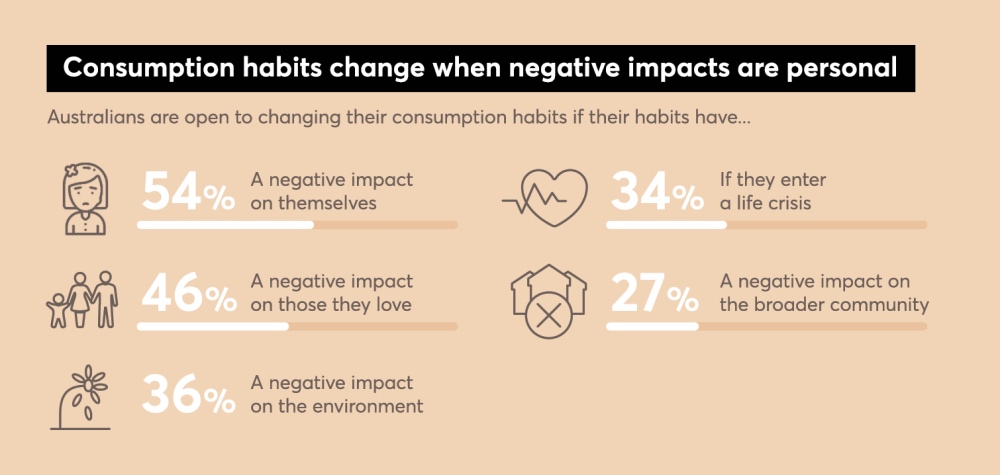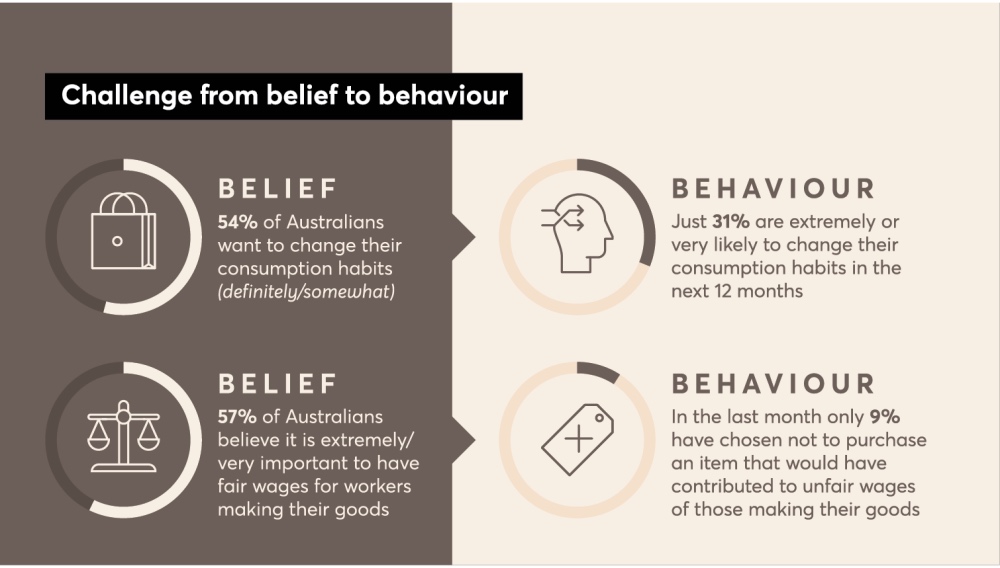
DAVID ADAMS reports on the findings of a new survey looking at what Australians – as well as, in particular, regular church-goers in Australia, think and how they behave when it comes to the issue of consumerism…
Consumerism is “alive and well” in Australia, according to the findings of a new report which shows that it affects people both within and without the church in similar ways.
Commissioned by Christian organisation Consumed, the report is based on surveys which highlight the differences and similarities between the views and actions of the Australian population at large and those who identity as Christians.

Gershon Nimbalker, campaign director at Consumed. PICTURE: Supplied
Gershon Nimbalker, campaign director at Consumed, says the research was carried out to see what the impact of consumerism was on Australians, but Christians in particular.
“The results…affirmed quite significantly this belief that our imagination has been captivated by these insidious forms of consumerism which have crept up on us unwittingly and shaped our values and our beliefs.”
“The results…affirmed quite significantly this belief that our imagination has been captivated by these insidious forms of consumerism which have crept up on us unwittingly and shaped our values and our beliefs.”
– Gershon Nimbalker, campaign director at Consumed.
Nimbalker, who was formerly advocacy manager at Baptist World Aid Australia, goes so far as to say he believes consumerism – and the research takes a broad approach allowing people to define what the term means to them – is the “greatest idol facing the church today”.
The study was based on surveys of a national representative sample of 1,001 Australians carried out in late May and early June and an additional 235 Australians who attend church least monthly, bringing to 401 the total number of Christians involved in the survey.
It shows four in five Australians believe they consume significantly more or much more than they need, three in five believe consumption habits are having a negative impact and about half want to change their consumption habits.
“At some level we’ve got all these indicators that point out that Australians are aware that consumerism is having a negative impact on their world, effecting them, and they want to break out of it,” says Nimbalker.
But he adds that only one in three believe it’s highly or very likely that they change their consumption habits in the next year.
The survey also reveals how consumerism is shaping the values of Australians. While “feeling happy”, “staying healthy/physically fit”, and, “strong relationships with friends and family” ranked in the top three indicators of what a “good life” means to Australians, including church-going Christians, Nimbalker says that beyond those top indicators, the way in which consumerism is shaping people’s values becomes more obvious.
Some 57 per cent of Australians said “having financial freedom and independence” represented the “good life” to them, 45 per cent said “owning a home”, 35 per cent said “travelling the world”, 26 per cent said “being well-regarded by those around me” and 20 per cent said “excelling in a career”.
“That covers the stuff that we buy and own, the experiences that we can have and the ability to be successful,” Nimbalker says. “What was really worrying for me in that data was that for Christians those things – stuff, experiences and success, were rated as significantly more important for the good life than impacting their community and impacting their world.”

Australian views on consumption habits. GRAPHIC: Consumed report
Just 23 per cent of church-going Christians associated “impacting their community” with the good life while just one in six associated “impacting the world” with it and while these figures were higher than those for the general population, Nimbalker says they’re still low.
“I think it’s a huge step away from the kind of people that the church is called to be,” says Nimbalker, who also noted that just 58 per cent associated “living out their faith” with the ‘good life’.
“For me, it’s a clear indicator that, even for people that are regularly attending church, consumerism has shaped them away from prioritising their faith in the world.”
While many of the survey’s results show little variance between responses from Christians and the Australian population generally, Nimbalker says there is some “really positive” news for the church and people of faith.
“Christians report lower levels of anxiety, lower levels of loneliness, they’re more likely to be in employment…and they report high levels of overall satisfaction with life,” he says. “So it seems that there is a correlation between Christianity and some really important impacts upon people’s lives.”
The data also shows church-going Christians were far more likely to support positive ethical actions like being generous to those around them (61 per cent compared to 49 per cent among the general population) and ensuring fair wages for those making their goods (63 per cent compared to 57 per cent), Nimbalker adds that those numbers were still much lower than anticipated among people whose world views should be defined by the ‘good life’ being found in the “richness” of loving God and loving others.
Nimbalker says that while things like travelling the world or eating great meals aren’t “intrinsically bad”, “it’s where our heart is at and how we are consuming those things”.
“We’ve got, in some senses, a lot of excess disposable wealth in a world where there is still such huge need – 880 million people are unsure if they’re going to have enough food today or tomorrow [and] six million children [are] dying before their fifth birthday every single year. And when we consume , we’re making choices, we’re making choices about what we do with our money. And in a world of such need – and it’s not just overseas, it’s here in Australia – I think we need to think really carefully about how we’re spending our money and whether we’re being generous enough.”

Contrast of belief and behaviour among Australians. GRAPHIC: Consumed report
Nimbalker says taking a Christian approach to consumption means also considering things like the ethics surrounding the production of goods – are they created by forced or child labour?, for example – along with the environmental impacts it has.
“Rethinking all that stuff in how we consume is really important too…” he says. “For us in the church, I guess the thing that I keep coming back to is [that] we should always be really conscious of this. It feels like consumerism has been an insidious thing that has crept up on us unwittingly and captivated our imaginations and we need to remove it and become refocused on finding our peace, our purpose and our contentedness in God and then reflecting that out in the world to magnify His love to everyone, particularly those in most need.”
Consumed, which will commission at least one more such survey to track how people’s thinking or behaviour many have changed, has produced a range of materials – including preaching, Bible study and prayer resources – to help churches engage with the issue which are available to download for free.
They’re also launching a book, written by Scott Higgins, which should be available from early October to help people take the first steps towards changing attitudes and behaviours towards consumerism.
The release of the research and the conversations – and perhaps changes in behaviour – that it sparks form part of Consumed’s afforts to address three key aims: clarifying the problem of consumerism for the church to see; to highlight solutions to it and amplify them; and, to create new solutions to what is a growing problem.
Consumed was formed by Seed, a Sydney-based Christian organisation which supports initiatives that bring “positive change in society and show the world what Jesus is like” and is supported by partner organisations including the Baptist Churches of NSW and ACT, Baptist World Aid Australia and Christian Super. Its brief is to to tackle the issue of consumerism both within and without the church.
Nimbalker says the pervasiveness of consumerism in Australian society makes the need for tools to address the issue all that more important.
“I think without having the right things to engage us, we’re fighting a losing battle.”





